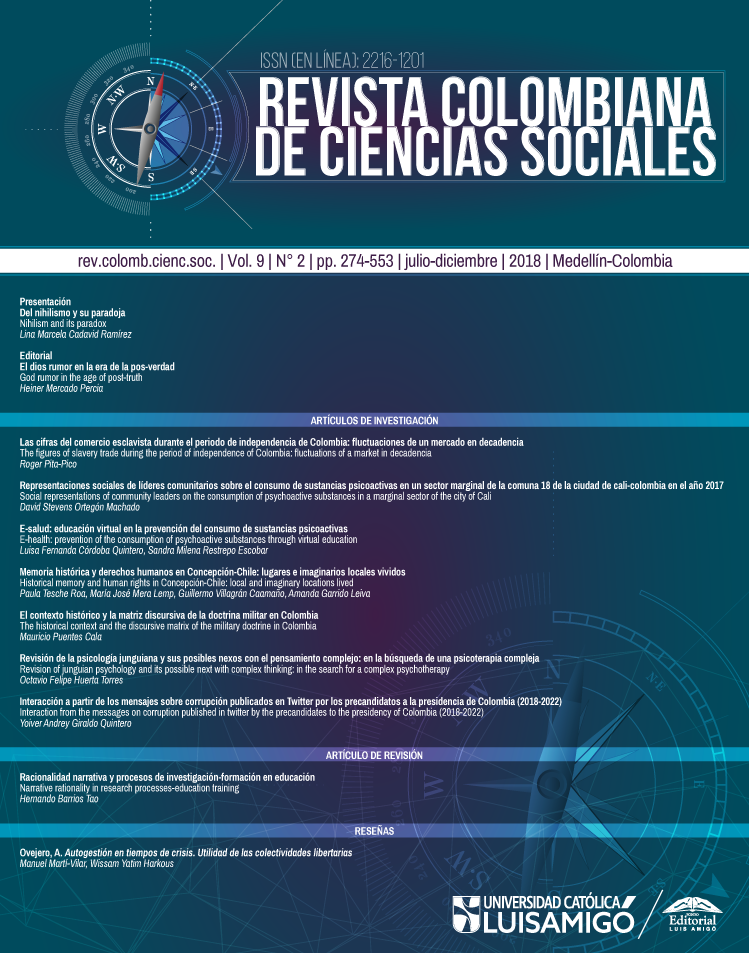REVIEW OF JUNGUIAN PSYCHOLOGY AND ITS POSSIBLE LINKS TO COMPLEX THINKING: IN SEARCH OF COMPLEX PSYCHOTHERAPY
DOI:
https://doi.org/10.21501/22161201.2457Keywords:
Jungian psychology, Carl Gustav Jung, Complex thinking, Complexity, PsychotherapyAbstract
This article develops several foundations of the Jungian psychology from the direct elaborations of its creator the Swiss psychologist Carl Gustav Jung, perspective also called, by many psychologists of this theory, like complex psychology. At the same time, some key ideas regarding Edgar Morin's complex thinking are presented, whose sustenance is derived from the complexity paradigm. In this exercise are found guidelines that could provide an epistemological support to some Jungian concepts, proposing, in turn, another look at this psychological current. Thus, as Jung proposed, it is understood that the recognition of the unconscious depths is as necessary for the subject as the understanding of his conscious and the dynamics between both. Recalling that, according to the complex thinking, it is in the concurrence, from where a more real approach towards the understanding of the systems is possible. It is understood then that the unconscious should not be explored exclusively in relation to that which afflicts the subject, as a repetition (circular), but also as to its creative facet —unconscious that with the help of consciousness, it becomes recursive (spiral) and source of healing.
Downloads
References
Castillo, J. (2010). Diapositivas y notas de la ponencia sobre la técnica de la imaginación activa, dictada durante la presentación del Libro Rojo, de C. G. Jung. [Diapositivas de PowerPoint]. Madrid: Fata Morgana. Recuperado de: http://www.fatamorgana.com.mx/FMimagenes/TemaDelMes/Marzo-2010-YO-SIMON-PARTE-2/Diapositivas-y-notas-ponencia-Libro-Rojo-JCC-a.pdf
Huerta, O. (2012). Revisión teórica de la psicología analítica de Carl Gustav Jung. Anuario de Psicología, 42(3), 411-419. Recuperado de: https://www.raco.cat/index.php/AnuarioPsicologia/article/view/262210/349393
Jung, C. (1999). Recuerdos, sueños, pensamientos. Barcelona: Seix Barral.
Jung, C. (2002). El hombre y sus símbolos. Barcelona: Noguer y Caralt.
Jung, C. (2004). La dinámica de lo inconsciente. Madrid: Trotta.
Jung, C. (2008). Tipos psicológicos. Madrid: Edhasa.
Jung, C. (2011). Aion. Contribuciones al simbolismo del sí mismo. Madrid: Trotta.
Kaplan, S. (1989). Jungian Senoi Dreamwork Manual. EEUU: Journey Press Berkeley.
Las Heras, A. (2008). Manual de psicología junguiana. Buenos Aires: Trama.
Morin, E. (1977). El método I. La naturaleza de la naturaleza. París: Seuil.
Morin, E. (1980). El método II. La vida de la vida. París: Seuil.
Morin, E. (1990). Introducción al pensamiento complejo. Francia: ESF.
Morin, E. (1991). El método IV. Las ideas. París: Seuil.
Morin, E. (1994). La noción de sujeto. En D. Schnitman (Comp.). Nuevos paradigmas, cultura y subjetividad. Buenos Aires: Paidós.
Morin, E. (2001). El método V. La humanidad de la humanidad. París: Seuil.
Morin, E. (2004). El método VI. La Ética. París: Seuil.
Nante, B. (2010). El libro rojo de Jung. Argentina: El Hilo de Ariadna.
Pascal, E. (2005). Jung para la vida cotidiana. Barcelona: Obelisco.
Pozzoli, M. (2012). Arte, belleza y espiritualidad desde el pensamiento complejo. Chile: Centro Mohammed VI.
Robertson, R. (2002). Introducción a la psicología junguiana. Barcelona: Obelisco.
Solares-Altamirano, B. (2011). Gilbert Durand, imagen y símbolo o hacia un nuevo espíritu antropológico. Revista Mexicana de Ciencias Políticas y Sociales, 56(211), 13-24. Recuperado de http://www.redalyc.org/articulo.oa?id=42119256002
Downloads
Published
How to Cite
Issue
Section
License
Copyright (c) 2018 Revista Colombiana de Ciencias Sociales

This work is licensed under a Creative Commons Attribution-NonCommercial-NoDerivatives 4.0 International License.
La revista y los textos individuales que en esta se divulgan están protegidos por las leyes de copyright y por los términos y condiciones de la Licencia Creative Commons Atribución-No Comercial-Sin Derivar 4.0 Internacional.











